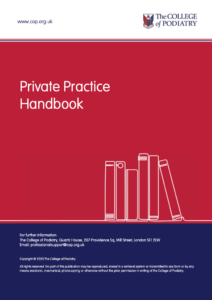A case of Graduate employment disharmony
 Falling out with employees forms the basis of this article. The narrative surrounds a case on a podiatry Facebook page where a new graduate was ‘let go’. Two crucial pieces of information came to the fore. First, the person had complaints against her, and secondly that an agreement was made not to set up a clinic under 10 miles from her employer’s practice. Lastly, should she, the employer do anything? As with all FB clinical posts, the evidence provided is thin, and more would be required to aid readers who could quickly become biased and empathic. ConsultingFootPain takes a broad view when analysing the evidence, and without all parties providing information, we MUST consider the case evidence incomplete. As a reflective piece, we can make some assumptions and dovetail objective evidence to make more sense. The next question to arise – Did the respondents help, hinder or confuse?
Falling out with employees forms the basis of this article. The narrative surrounds a case on a podiatry Facebook page where a new graduate was ‘let go’. Two crucial pieces of information came to the fore. First, the person had complaints against her, and secondly that an agreement was made not to set up a clinic under 10 miles from her employer’s practice. Lastly, should she, the employer do anything? As with all FB clinical posts, the evidence provided is thin, and more would be required to aid readers who could quickly become biased and empathic. ConsultingFootPain takes a broad view when analysing the evidence, and without all parties providing information, we MUST consider the case evidence incomplete. As a reflective piece, we can make some assumptions and dovetail objective evidence to make more sense. The next question to arise – Did the respondents help, hinder or confuse?
Respondent comments
Thirty-nine professional members commented. Five have been selected and labelled A-E. I looked at practice guidelines from the Royal College of Podiatry (RCoP).
Contract
One member raises the issue that 10 miles is ‘huge’ and that other clinics will be operational in the area, so the effect is not significant (A). Another colleague believed the contract to be unreasonable. Is this enforceable? (B)
While another respondent firmly believed not, but stated, ‘you cannot stop someone practicing their profession…’ (C)
Job description
A balanced response suggested ‘apprentice is the way. Mold them as you need them.’ (D)
Another answer offered in the same vein ‘did you try and teach her and give her lots of guidance if she is a new graduate? Could you have done anything differently to help her so you didn’t have to fire her and so she didn’t get complaints?’ (E)
Other responses followed a similar pattern, but there is no who was right, who was wrong. The first thing to say is that this series of comments is an excellent learning curve and hopefully will guide people in their role as mentors to the young. Unfortunately, we do not have the response from the new graduate which would allow a balanced view. Young graduates perhaps must understand as much as their senior colleagues, that private practice is different from the NHS, where natural systems ideally support and allow growth with experience.
The facts around employment

First, let us look at what the profession says. The RCoP offers a valuable document published in 2020 with a wide range of topics for all wanting to commence practice. The HCPC does not deal with this area, and a quick check revealed little to marry with the case. The following material is a distillation of information from experienced members from the Royal College of Podiatry. Employing someone means that the duty rests with the person who engages that individual; and yet podiatrists have different forms of employment, including self-employed. Rather than drop off the edge of the topic, we will stay with the employed. With an Associate, the relationship is different. Given our case – a new graduate (age unknown) – we will assume this could be a young inexperienced person without an employment record or someone with previous experience. Ideally, we treat both similarly for the role in your practice. However, if they have skills due to former life experience in other sectors, one might seek to exploit such features mutually. The idea of setting up your practice with a view to using an employed person should be based on your need to hire someone and their need for employment.
The Interview
The interview should establish ensure that any understanding is mutual. The four points below come from the handbook (mentioned above) around interviews.
- Use the interview to answer two questions: can the person do the job, and will they want to.
- Make notes at the interview and keep these safe for six months if someone complains that you have unlawfully discriminated.
- Always ask for references, wherever possible, one being from a current or recent employer wherever practical.
- Never offer a post until you have received references. And never offer a job subject until satisfactory references have been received because if you withdraw the offer after receiving the references, you are undermining the confidential nature of the reference.
A job description can be helpful to decide the knowledge, skills, and experience. The part about qualifications and expertise suggests that you are clear on what is essential. People tend to want to appoint staff with the same strengths as themselves. It can, however, be helpful to select individuals with different strengths and weaknesses in order to build a more effective team. Application forms can offer the employer protection, particularly if a statement such as ‘I declare that the information given in this form is true and complete and that false information may result in my dismissal if appointed’ is included just above the signature. Private Practice Handbook Page 127 of 168
Forming a contract
 A contract defines the terms of employment and, for the employer, can be an effective tool to make deductions of money owed when someone leaves, to control holiday absences, and to prevent someone from setting up in competition when they leave (RCoP). Terms of employment need to be clearly expressed, then the conduct of the parties, custom, and practice, and the practice’s rules make it more difficult for employers to control and lead to contract drift. Therefore, writing down the terms of the contract can be an advantage and a requirement. Details must include a wide range of areas from sick pay and holidays through to grievance and discipline. My advice to any member of an organisation is to check the guidance of your professional body. In the case of the RCoP, it is clear, helpful, informative, and educational. The job title and brief job description are essential. In the case described by the employing podiatrist, the contract was allegedly ignored, and the question became a case of ‘do I let it go, or do I raise it?’
A contract defines the terms of employment and, for the employer, can be an effective tool to make deductions of money owed when someone leaves, to control holiday absences, and to prevent someone from setting up in competition when they leave (RCoP). Terms of employment need to be clearly expressed, then the conduct of the parties, custom, and practice, and the practice’s rules make it more difficult for employers to control and lead to contract drift. Therefore, writing down the terms of the contract can be an advantage and a requirement. Details must include a wide range of areas from sick pay and holidays through to grievance and discipline. My advice to any member of an organisation is to check the guidance of your professional body. In the case of the RCoP, it is clear, helpful, informative, and educational. The job title and brief job description are essential. In the case described by the employing podiatrist, the contract was allegedly ignored, and the question became a case of ‘do I let it go, or do I raise it?’
Always update paperwork after a review
Contracts should be reviewed, and this is as much part of the annual appraisal. Businesses, including the NHS, work on temporary bedding in periods to allow both sides to reflect on the experience of working together. Scheduled reviews enhance the benefits of working together. However, contracts should not be altered without mutual agreement. Claims for unfair dismissal if ignored loom over the horizon. There must be reasonable grounds before ending a contract. The employer does not want to end up being taken to an Employment Tribunal to seek compensation. There are five reasons for which you can fairly dismiss, and they are:
- incompetence;
- misconduct;
- redundancy;
- exceptional circumstances (e.g. loss of driving license if work is predominantly domiciliary); and
- another significant business reason.
The RCoP rightly suggests seeking advice. Now we do not know anything about this case as far as membership is concerned, but it would seem wise to employ your professional membership services for advice for such cases.
Were the respondents correct?
Reflecting on the evidence from all parties helps us draw the article together.
Miles as a restriction and limiting practice
Rules over distance from the practice come under a restrictive covenant. For example, you can restrict someone from setting up after leaving you and setting up in competition. However, it has to be reasonable. For example, working in the same town is a reasonable restriction but may require a period. The RCoP guide suggests, ‘Within podiatry, it may be reasonable to seek to prevent someone working within two miles of the practice for one year. Anything more may appear unreasonable. Within rural areas, it may be possible to extend the geographic area, but this is unlikely to be successfully upheld within urban areas.’
Covenants must be reasonable and realistic. The employer who ensures this is within the contract at the start and has an agreement with the employees will find this legally binding. The contract was unreasonable. Is this enforceable? The above points suggest the agreement was unreasonable. However, when it comes to stopping someone from practising, that is not possible for a member of a professional body to undertake. Processes exist to ensure that appropriate standards safeguard the public—namely the professional’s Ethics Committee and HCPC. Two considerations come out of the arguments so far. The contract could have been legally binding and would have benefitted from legal advice from the professional body. The employee could have ensured a local lawyer drew up the contract based on correct terms of employment. Having a legally validated document would have made matters clear.
Attitudes toward employment
Newly qualified people take a minimum of a year to settle into work. University education and practice are very different, and so employers must recognise inexperienced colleagues entering the profession from afresh. At the same time, the post-graduate have many essential skills to practice safely; they do not have more comprehensive experience of the practice owner-podiatrist. Apprenticeship as a way forward is sensible and sensitive to their need. They will move on in many cases, and therefore this can only benefit the employer who can show those with less experience support.
If one employs someone as a ‘pair of hands because the practice is busy, look for an Associate post applicant with experience to take on a full caseload. Although the original blogger did seem concerned with managing a busy practice, efficiency and management form a different topic. A graduate cannot take on this responsibility. We should come back to both the job application and interview as well as the contract covering expectations. This must be conducted optimally.
Could you have done anything differently?
Hindsight –
“Before, you are wise; after, you are wise. In between, you are otherwise.”
― David Zindell, The Broken God
Of course, we can all say this. The employee is a resource but also someone to nurture and from whom benefit may be derived. As much as we do not know one side of the story, there will be many aspects to learn for all parties.
- Better interview and selection technique, maybe?
- Then there is the importance of being clear about expected duties and the rules of engagement.
Practices take years of hard work to achieve success. The practice thrives because of the owner-podiatrist’s personality. Students cannot leave education and become knowledgeable overnight without induction, so this will take time. This article is neither judgemental nor intended to be dictatorial. What I can say is that I was dismissed after a six-month legal contract and forbidden to set up closer than 5 miles. I set up in the next town, which was over this distance, but we did not part on the best terms. As I reflected on my experience in my autobiographical book, seeing the blog on a professional Facebook site reminded me that “The historian is a prophet looking backwards.” ― Friedrich Von Schlegel, Philosophical Fragments.
The information and nature of the comments raised within this Facebook post have helped readers of ConsultingFootPain test graduate employment. With special thanks to the Royal College of Podiatry for providing members with a comprehensive handbook to Independent Practice.
Read other Facebook articles at ConsultingFootPain

- Writing to a GP about your patient
- Does your patient follow your advice?
- Pain after Injections for Nail Surgery
- Ultrasound in focus and Podiatry
- Should you write to the patient’s GP
Thanks for reading Falling out with Employees by David R Tollafield
Published by Busypencilcase Reflective Communications Est. 2015

Published 13th September 2021

Recent Comments